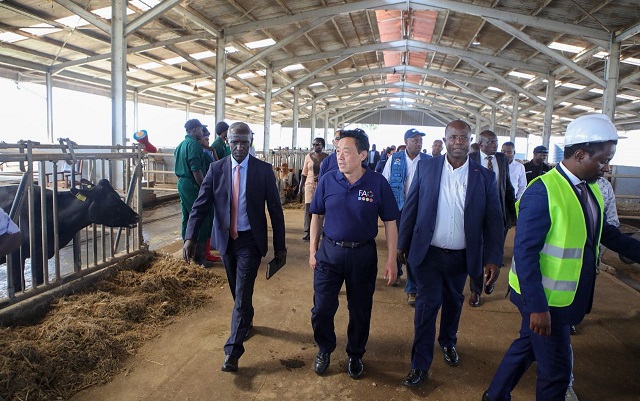
Kampala, Uganda | THE INDEPENDENT | Uganda and the Food and Agriculture Organisation of the United Nations (FAO) have reaffirmed their commitment to strengthening collaboration in agricultural research, food systems transformation, and innovation-driven development.
The commitment was announced during a visit by FAO Director-General Dr. Qu Dongyu to the National Agricultural Research Organisation (NARO), where Uganda showcased its growing capacity for science-based solutions in agriculture, vaccine development, data systems, and agri-industrialisation.
Dr. Yona Baguma, the Director General of NARO, highlighted the organisation’s pivotal role in Uganda’s national transformation. “NARO is an engine of this nation. We are proud of the technologies we have developed, which are contributing to food security, nutrition, environmental sustainability, and economic growth,” he said. Baguma acknowledged FAO’s significant support to NARO in 2024, totalling 1.88 billion, which contributed to seed system development and other research milestones.
He appealed for continued FAO support in priority areas such as horticulture, spices, soil science, crop nutrition, food processing, and advanced data analytics. “We request FAO’s collaboration in applying informatics and data systems to improve productivity, nutrition, and innovation for both human and animal health,” he noted.
State Minister for Agriculture, Fred Kyakulaga, commended FAO’s longstanding support and praised the harmony that has defined its cooperation with Uganda over the years. “Almost everything we showcased today has FAO’s footprint. That tells you how deeply embedded your support is in our agricultural progress,” he said.
Kyakulaga, outlined Uganda’s new priorities under its fourth National Development Plan, with a strong emphasis on developing a Vaccine and Pharmaceutical City on 100 acres of land. “This is an ambitious initiative, and one of your top priorities. We ask for FAO’s collaboration in making this dream of self-reliance in veterinary and pharmaceutical production a reality,” he noted.
The minister emphasised Uganda’s ambition to turn research into market-ready innovations, pointing out the Hand-in-Hand initiative and FAO’s role in helping Uganda link its research prototypes to investors, particularly in dairy, maize, animal feed, vaccines, and agro-industrial inputs.
Mechanisation and commercialisation, the minister noted, are the other frontiers for deepening collaboration. Kyakulaga also applauded FAO’s One Country, One Priority Product initiative, under which Uganda selected cocoa as its flagship crop, despite strong competition from sweet potato, under which Uganda was the second-largest producer.
FAO Director-General Dr. Qu Dongyu recognised NARO’s transformation into one of Africa’s most promising research institutions. Drawing from his extensive background in science and government, he commended Uganda’s progress in shifting from traditional agriculture to an innovation-led food system. “You are moving from a traditional academic organisation to a modern agro-food service hub serving farmers, industries, and even international markets,” said Dr. Qu. “This is real transformation. Uganda is on a promising track, and NARO is leading the way.”
He emphasised that successful agricultural institutions must be recognised not only by their peers in the scientific community but also by governments, farmers, and the private sector. “This multidimensional relevance is key to national and global impact,” he added.
He cautioned against the pitfalls seen in some developed countries where scientists lost credibility by isolating themselves from national needs and real-world challenges. “Uganda must use science and data to build a strong innovation ecosystem that propels it from a low-income to a high-income country,” he said. “Science-based solutions, data-driven approaches, and innovation-powered systems are the way forward.”
Dongyu pledged further FAO support through its Technical Cooperation Programme (TCP), and encouraged Uganda to actively engage in the From Seed to Food investment forum in Rome this October. “This is your platform. Use it to attract investors, build alliances, and promote Uganda’s agricultural excellence,” he said.
The FAO chief urged Uganda to use FAO not just as a development partner but as a global platform for recognition, influence, and competitiveness.
***
URN
 The Independent Uganda: You get the Truth we Pay the Price
The Independent Uganda: You get the Truth we Pay the Price





